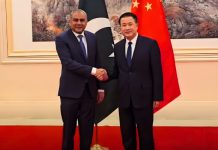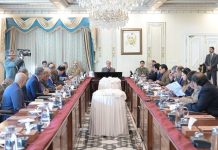| Island nation is grappling with its worst economic downturn since independence with regular blackouts
DM Monitoring
COLOMBO: Crisis-stricken Sri Lanka has defaulted on its $51 billion external debt after running out of foreign exchange to import desperately needed goods.
“The government is taking the emergency measure only as a last resort in order to prevent further deterioration of the republic’s financial position,” Sri Lanka’s finance ministry said in a statement on Tuesday. It added that the immediate debt default was to ensure “fair and equitable treatment of all creditors” ahead of an International Monetary Fund (IMF)-assisted recovery programme for the South Asian nation.
“It has come to a point that making debt payments are challenging and impossible. The best action that can be taken is to restructure debt and avoid a hard default,” central bank Governor P. Nandalal Weerasinghe told reporters.
The governor said the action was being taken in good faith, emphasising that the country of 22 million people had never defaulted on its debt payments.
“This will be on a temporary basis until we come to an agreement with creditors and with the support of a programme with the IMF,” said Weerasinghe, who took office last week amid growing public unrest triggered by the economic crisis. “We need to focus on essential imports and not have to worry about servicing external debt,” he said.
Sri Lanka is grappling with its worst economic downturn since independence, with regular blackouts and acute shortages of food and fuel.
International rating agencies had downgraded Sri Lanka last year, effectively blocking the country from accessing foreign capital markets to raise much-needed loans to finance imports.
Sri Lanka had sought debt relief from India and China, but both countries instead offered more credit lines to buy commodities from them.
The island nation’s foreign reserves stood at a paltry $1.93 billion at the end of March, with foreign debt payments of around $4 billion due this year, including a $1 billion international sovereign bond maturing in July.
Sri Lanka will need about $3 billion in external assistance within the next six months to help restore supplies of essential items, including fuel and medicines as the government looks to manage a severe economic crisis.
“It’s a Herculean task,” Finance Minister Ali Sabry said in his first interview on Saturday since taking office this week, referring to finding $3 billion in bridge financing as the country readied for negotiations with the International Monetary Fund (IMF) this month.
The island nation of 22 million people has been hit by prolonged power cuts, with drugs, fuel and other items running short, bringing angry protesters out on the streets and putting President Gotabaya Rajapaksa under mounting pressure.
The South Asian island nation will look to restructure international sovereign bonds and seek a moratorium on payments, and is confident of negotiating with bondholders for an upcoming $1 billion payment in July.
“The entire effort is not to go for a hard default,” Sabry said. “We understand the consequences of a hard default.”
J.P. Morgan analysts estimated this week that Sri Lanka’s gross debt servicing would amount to $7 billion this year, with the current account deficit coming in around $3 billion.
The country has $12.55 billion in outstanding international sovereign bonds, according to central bank data, and foreign reserves of $1.93 billion at the end of March.
“The first priority is to see that we get back to the normal supply channel in terms of fuel, gas, drugs… and thereby electricity so that the people’s uprising can be addressed,” Sabry said.



